Planning Handbook: Strategies, Implementation & Key Definitions
VerifiedAdded on 2023/06/10
|11
|1752
|157
Report
AI Summary
This document is a comprehensive handbook on the planning process, covering key concepts, definitions, and strategies. It begins by defining fundamental elements such as 'Plan,' 'Conceptual Skill,' 'Planning Process,' 'Inspection,' 'Implementation,' 'Direction,' 'Planning Time Horizons,' and 'Performance,' providing explanations and examples for each. The handbook then explores different types of plans, including strategic, operational, tactical, action, single-use, standing, and contingency plans. Methods of planning, such as crisis, scenario, decentralized, centralized, normative planning, and brainstorming, are also discussed. Furthermore, the document delves into planning models, specifically the classical and administrative models, and levels of strategy, including corporate, business, and functional levels. Finally, it provides an overview of SWOT analysis, detailing strengths, weaknesses, opportunities, and threats. This handbook serves as a valuable resource for understanding the multifaceted aspects of planning.
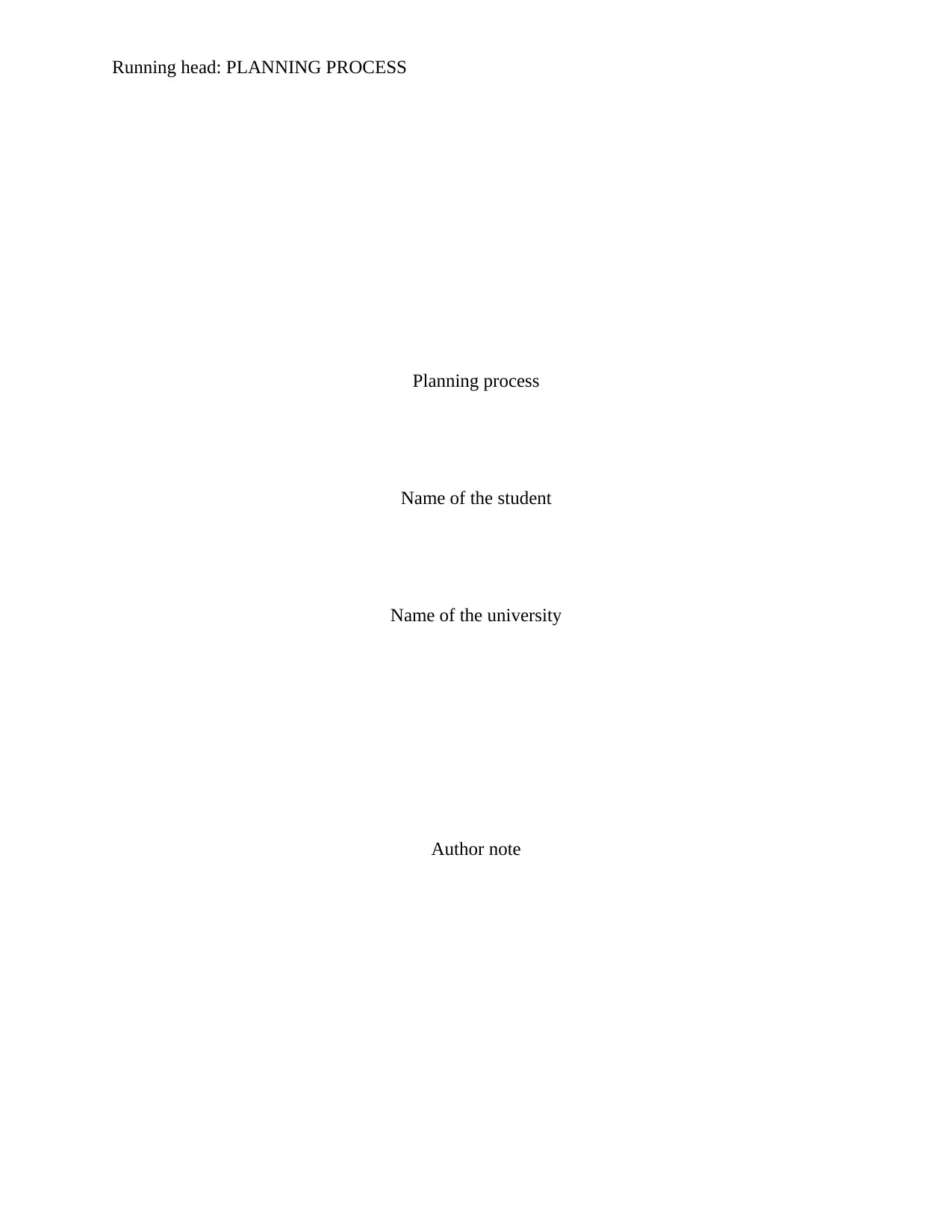
Running head: PLANNING PROCESS
Planning process
Name of the student
Name of the university
Author note
Planning process
Name of the student
Name of the university
Author note
Paraphrase This Document
Need a fresh take? Get an instant paraphrase of this document with our AI Paraphraser
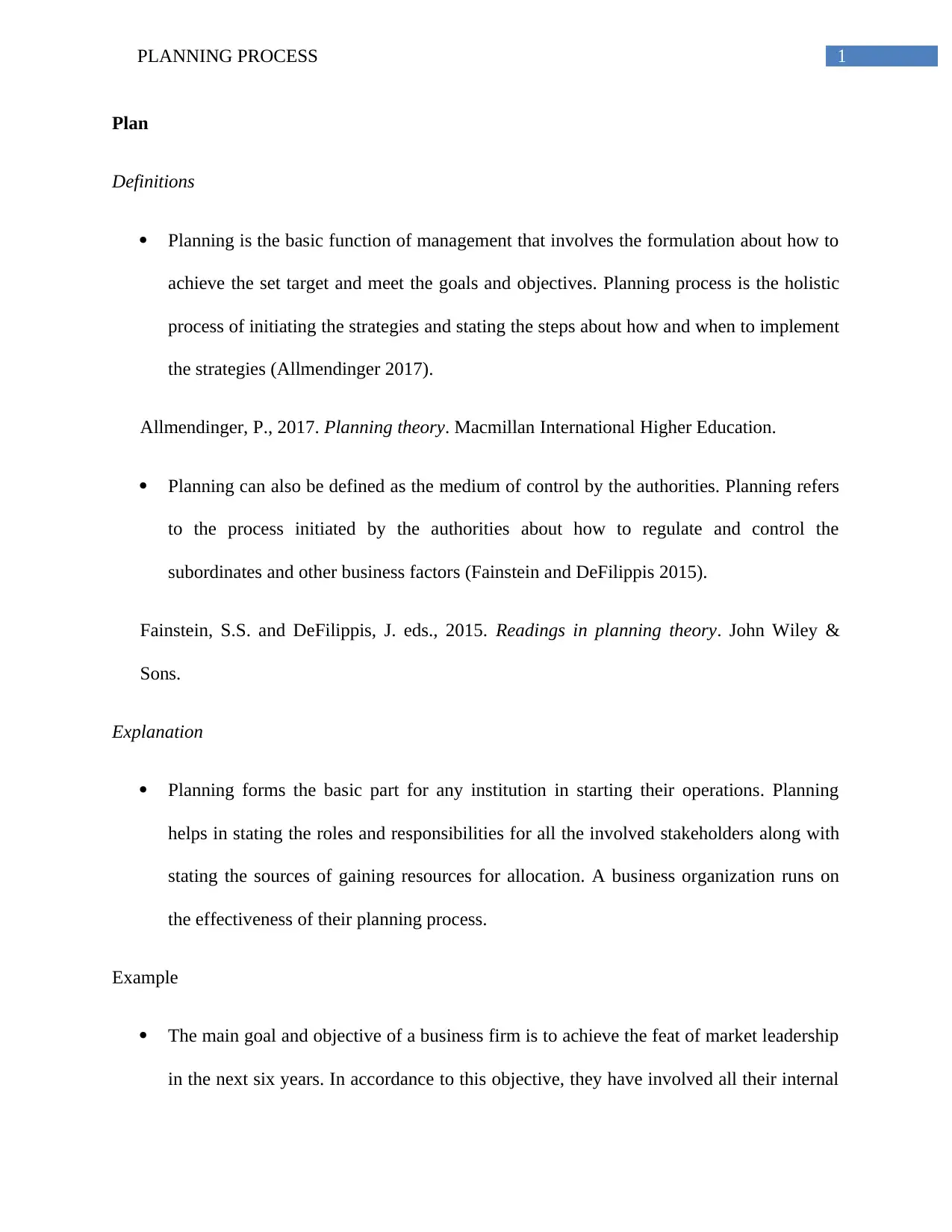
1PLANNING PROCESS
Plan
Definitions
Planning is the basic function of management that involves the formulation about how to
achieve the set target and meet the goals and objectives. Planning process is the holistic
process of initiating the strategies and stating the steps about how and when to implement
the strategies (Allmendinger 2017).
Allmendinger, P., 2017. Planning theory. Macmillan International Higher Education.
Planning can also be defined as the medium of control by the authorities. Planning refers
to the process initiated by the authorities about how to regulate and control the
subordinates and other business factors (Fainstein and DeFilippis 2015).
Fainstein, S.S. and DeFilippis, J. eds., 2015. Readings in planning theory. John Wiley &
Sons.
Explanation
Planning forms the basic part for any institution in starting their operations. Planning
helps in stating the roles and responsibilities for all the involved stakeholders along with
stating the sources of gaining resources for allocation. A business organization runs on
the effectiveness of their planning process.
Example
The main goal and objective of a business firm is to achieve the feat of market leadership
in the next six years. In accordance to this objective, they have involved all their internal
Plan
Definitions
Planning is the basic function of management that involves the formulation about how to
achieve the set target and meet the goals and objectives. Planning process is the holistic
process of initiating the strategies and stating the steps about how and when to implement
the strategies (Allmendinger 2017).
Allmendinger, P., 2017. Planning theory. Macmillan International Higher Education.
Planning can also be defined as the medium of control by the authorities. Planning refers
to the process initiated by the authorities about how to regulate and control the
subordinates and other business factors (Fainstein and DeFilippis 2015).
Fainstein, S.S. and DeFilippis, J. eds., 2015. Readings in planning theory. John Wiley &
Sons.
Explanation
Planning forms the basic part for any institution in starting their operations. Planning
helps in stating the roles and responsibilities for all the involved stakeholders along with
stating the sources of gaining resources for allocation. A business organization runs on
the effectiveness of their planning process.
Example
The main goal and objective of a business firm is to achieve the feat of market leadership
in the next six years. In accordance to this objective, they have involved all their internal
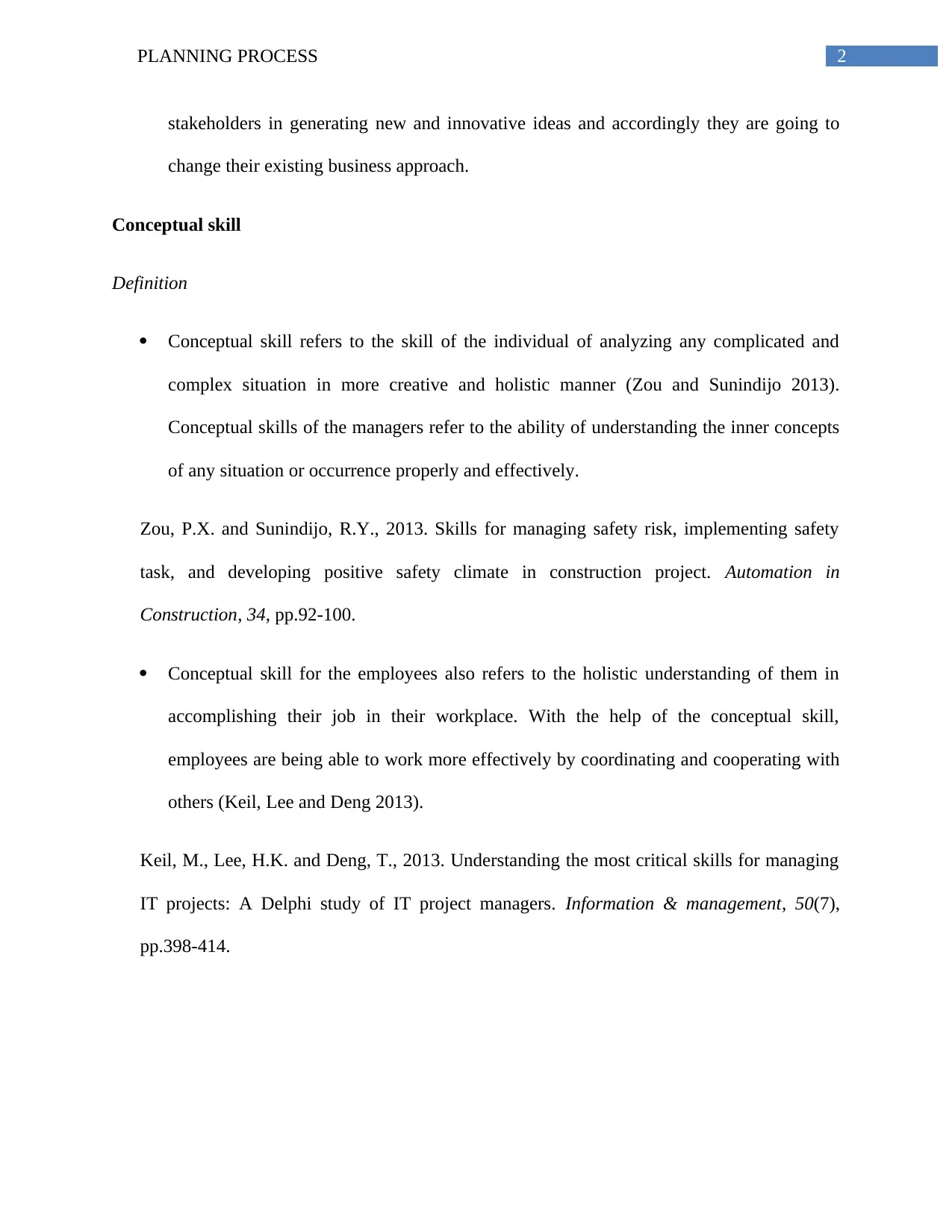
2PLANNING PROCESS
stakeholders in generating new and innovative ideas and accordingly they are going to
change their existing business approach.
Conceptual skill
Definition
Conceptual skill refers to the skill of the individual of analyzing any complicated and
complex situation in more creative and holistic manner (Zou and Sunindijo 2013).
Conceptual skills of the managers refer to the ability of understanding the inner concepts
of any situation or occurrence properly and effectively.
Zou, P.X. and Sunindijo, R.Y., 2013. Skills for managing safety risk, implementing safety
task, and developing positive safety climate in construction project. Automation in
Construction, 34, pp.92-100.
Conceptual skill for the employees also refers to the holistic understanding of them in
accomplishing their job in their workplace. With the help of the conceptual skill,
employees are being able to work more effectively by coordinating and cooperating with
others (Keil, Lee and Deng 2013).
Keil, M., Lee, H.K. and Deng, T., 2013. Understanding the most critical skills for managing
IT projects: A Delphi study of IT project managers. Information & management, 50(7),
pp.398-414.
stakeholders in generating new and innovative ideas and accordingly they are going to
change their existing business approach.
Conceptual skill
Definition
Conceptual skill refers to the skill of the individual of analyzing any complicated and
complex situation in more creative and holistic manner (Zou and Sunindijo 2013).
Conceptual skills of the managers refer to the ability of understanding the inner concepts
of any situation or occurrence properly and effectively.
Zou, P.X. and Sunindijo, R.Y., 2013. Skills for managing safety risk, implementing safety
task, and developing positive safety climate in construction project. Automation in
Construction, 34, pp.92-100.
Conceptual skill for the employees also refers to the holistic understanding of them in
accomplishing their job in their workplace. With the help of the conceptual skill,
employees are being able to work more effectively by coordinating and cooperating with
others (Keil, Lee and Deng 2013).
Keil, M., Lee, H.K. and Deng, T., 2013. Understanding the most critical skills for managing
IT projects: A Delphi study of IT project managers. Information & management, 50(7),
pp.398-414.
⊘ This is a preview!⊘
Do you want full access?
Subscribe today to unlock all pages.

Trusted by 1+ million students worldwide
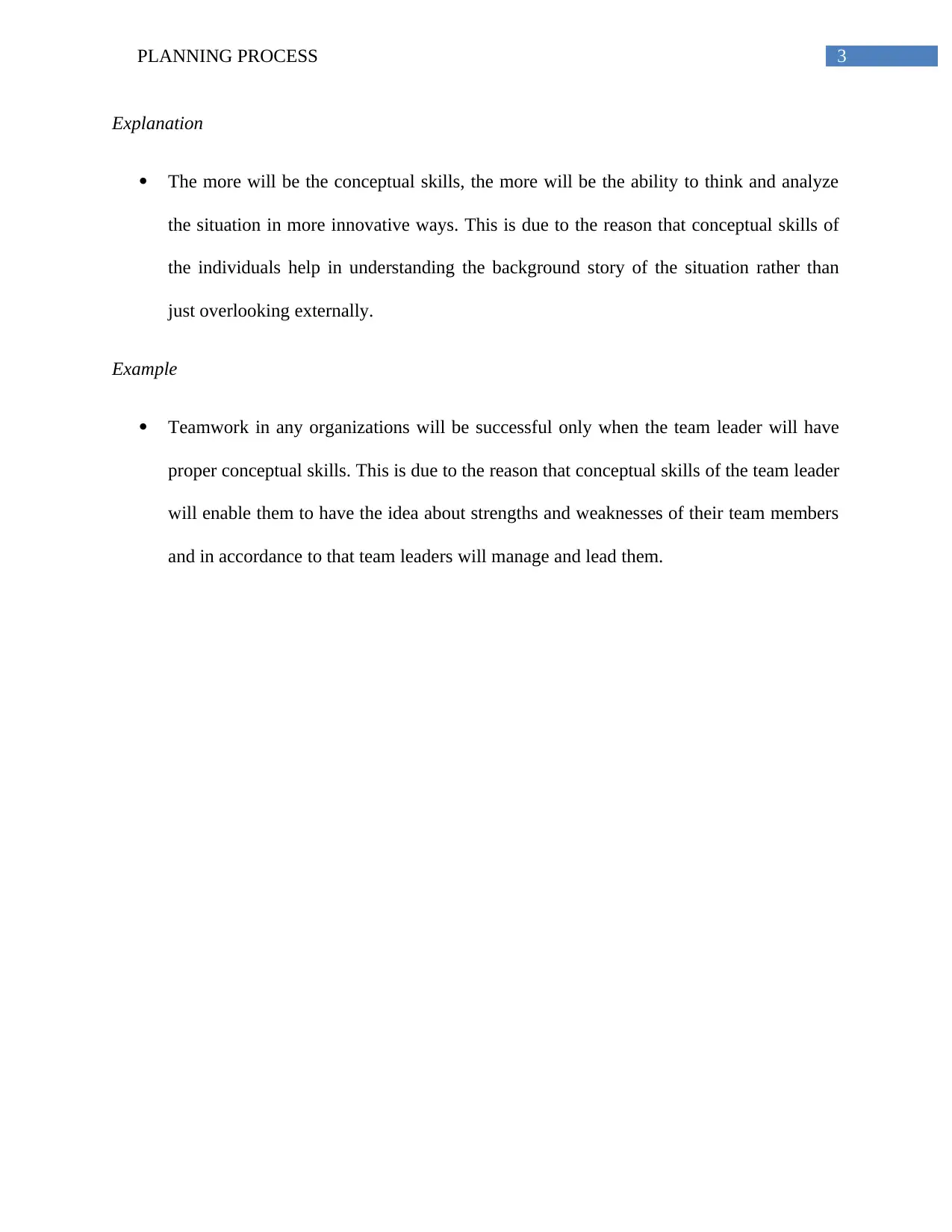
3PLANNING PROCESS
Explanation
The more will be the conceptual skills, the more will be the ability to think and analyze
the situation in more innovative ways. This is due to the reason that conceptual skills of
the individuals help in understanding the background story of the situation rather than
just overlooking externally.
Example
Teamwork in any organizations will be successful only when the team leader will have
proper conceptual skills. This is due to the reason that conceptual skills of the team leader
will enable them to have the idea about strengths and weaknesses of their team members
and in accordance to that team leaders will manage and lead them.
Explanation
The more will be the conceptual skills, the more will be the ability to think and analyze
the situation in more innovative ways. This is due to the reason that conceptual skills of
the individuals help in understanding the background story of the situation rather than
just overlooking externally.
Example
Teamwork in any organizations will be successful only when the team leader will have
proper conceptual skills. This is due to the reason that conceptual skills of the team leader
will enable them to have the idea about strengths and weaknesses of their team members
and in accordance to that team leaders will manage and lead them.
Paraphrase This Document
Need a fresh take? Get an instant paraphrase of this document with our AI Paraphraser
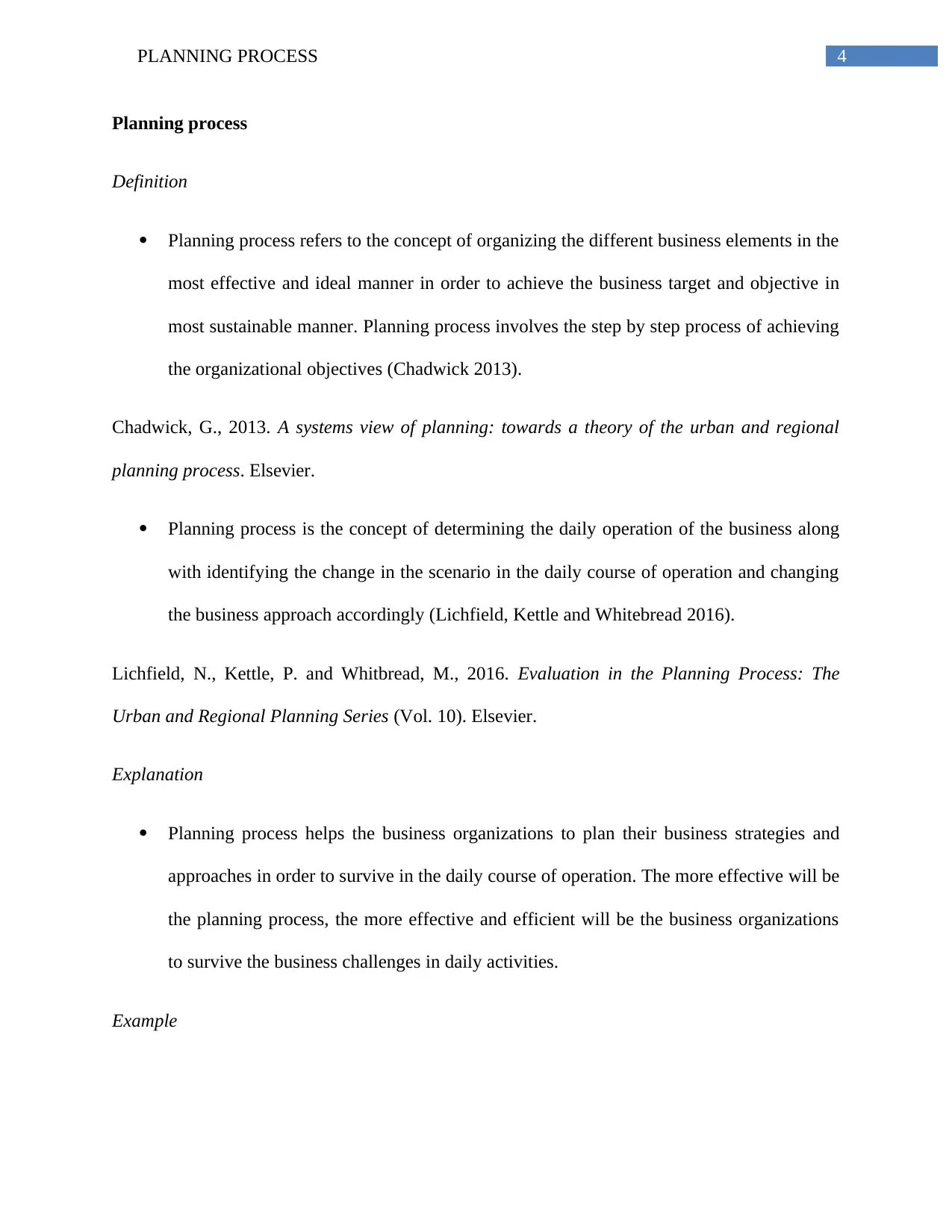
4PLANNING PROCESS
Planning process
Definition
Planning process refers to the concept of organizing the different business elements in the
most effective and ideal manner in order to achieve the business target and objective in
most sustainable manner. Planning process involves the step by step process of achieving
the organizational objectives (Chadwick 2013).
Chadwick, G., 2013. A systems view of planning: towards a theory of the urban and regional
planning process. Elsevier.
Planning process is the concept of determining the daily operation of the business along
with identifying the change in the scenario in the daily course of operation and changing
the business approach accordingly (Lichfield, Kettle and Whitebread 2016).
Lichfield, N., Kettle, P. and Whitbread, M., 2016. Evaluation in the Planning Process: The
Urban and Regional Planning Series (Vol. 10). Elsevier.
Explanation
Planning process helps the business organizations to plan their business strategies and
approaches in order to survive in the daily course of operation. The more effective will be
the planning process, the more effective and efficient will be the business organizations
to survive the business challenges in daily activities.
Example
Planning process
Definition
Planning process refers to the concept of organizing the different business elements in the
most effective and ideal manner in order to achieve the business target and objective in
most sustainable manner. Planning process involves the step by step process of achieving
the organizational objectives (Chadwick 2013).
Chadwick, G., 2013. A systems view of planning: towards a theory of the urban and regional
planning process. Elsevier.
Planning process is the concept of determining the daily operation of the business along
with identifying the change in the scenario in the daily course of operation and changing
the business approach accordingly (Lichfield, Kettle and Whitebread 2016).
Lichfield, N., Kettle, P. and Whitbread, M., 2016. Evaluation in the Planning Process: The
Urban and Regional Planning Series (Vol. 10). Elsevier.
Explanation
Planning process helps the business organizations to plan their business strategies and
approaches in order to survive in the daily course of operation. The more effective will be
the planning process, the more effective and efficient will be the business organizations
to survive the business challenges in daily activities.
Example
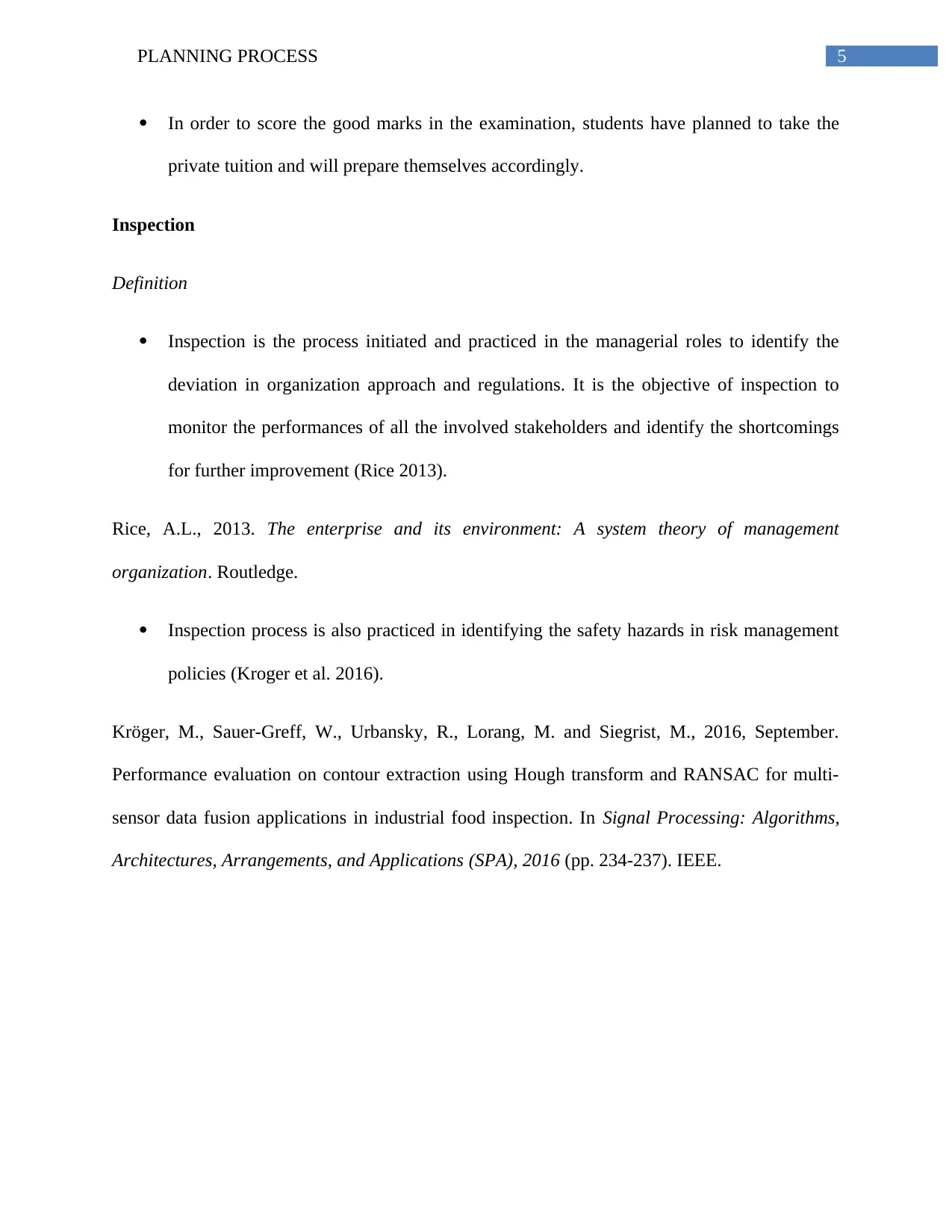
5PLANNING PROCESS
In order to score the good marks in the examination, students have planned to take the
private tuition and will prepare themselves accordingly.
Inspection
Definition
Inspection is the process initiated and practiced in the managerial roles to identify the
deviation in organization approach and regulations. It is the objective of inspection to
monitor the performances of all the involved stakeholders and identify the shortcomings
for further improvement (Rice 2013).
Rice, A.L., 2013. The enterprise and its environment: A system theory of management
organization. Routledge.
Inspection process is also practiced in identifying the safety hazards in risk management
policies (Kroger et al. 2016).
Kröger, M., Sauer-Greff, W., Urbansky, R., Lorang, M. and Siegrist, M., 2016, September.
Performance evaluation on contour extraction using Hough transform and RANSAC for multi-
sensor data fusion applications in industrial food inspection. In Signal Processing: Algorithms,
Architectures, Arrangements, and Applications (SPA), 2016 (pp. 234-237). IEEE.
In order to score the good marks in the examination, students have planned to take the
private tuition and will prepare themselves accordingly.
Inspection
Definition
Inspection is the process initiated and practiced in the managerial roles to identify the
deviation in organization approach and regulations. It is the objective of inspection to
monitor the performances of all the involved stakeholders and identify the shortcomings
for further improvement (Rice 2013).
Rice, A.L., 2013. The enterprise and its environment: A system theory of management
organization. Routledge.
Inspection process is also practiced in identifying the safety hazards in risk management
policies (Kroger et al. 2016).
Kröger, M., Sauer-Greff, W., Urbansky, R., Lorang, M. and Siegrist, M., 2016, September.
Performance evaluation on contour extraction using Hough transform and RANSAC for multi-
sensor data fusion applications in industrial food inspection. In Signal Processing: Algorithms,
Architectures, Arrangements, and Applications (SPA), 2016 (pp. 234-237). IEEE.
⊘ This is a preview!⊘
Do you want full access?
Subscribe today to unlock all pages.

Trusted by 1+ million students worldwide
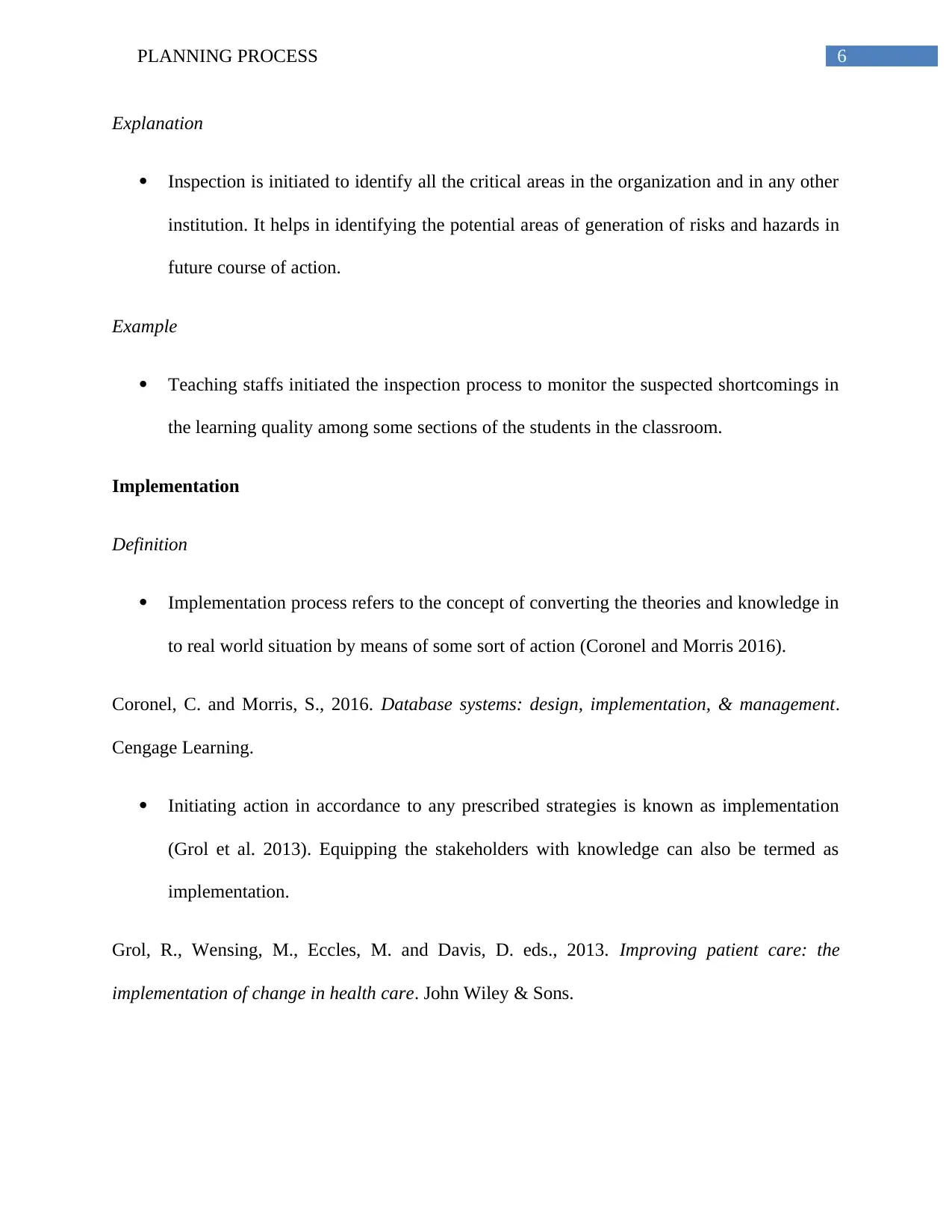
6PLANNING PROCESS
Explanation
Inspection is initiated to identify all the critical areas in the organization and in any other
institution. It helps in identifying the potential areas of generation of risks and hazards in
future course of action.
Example
Teaching staffs initiated the inspection process to monitor the suspected shortcomings in
the learning quality among some sections of the students in the classroom.
Implementation
Definition
Implementation process refers to the concept of converting the theories and knowledge in
to real world situation by means of some sort of action (Coronel and Morris 2016).
Coronel, C. and Morris, S., 2016. Database systems: design, implementation, & management.
Cengage Learning.
Initiating action in accordance to any prescribed strategies is known as implementation
(Grol et al. 2013). Equipping the stakeholders with knowledge can also be termed as
implementation.
Grol, R., Wensing, M., Eccles, M. and Davis, D. eds., 2013. Improving patient care: the
implementation of change in health care. John Wiley & Sons.
Explanation
Inspection is initiated to identify all the critical areas in the organization and in any other
institution. It helps in identifying the potential areas of generation of risks and hazards in
future course of action.
Example
Teaching staffs initiated the inspection process to monitor the suspected shortcomings in
the learning quality among some sections of the students in the classroom.
Implementation
Definition
Implementation process refers to the concept of converting the theories and knowledge in
to real world situation by means of some sort of action (Coronel and Morris 2016).
Coronel, C. and Morris, S., 2016. Database systems: design, implementation, & management.
Cengage Learning.
Initiating action in accordance to any prescribed strategies is known as implementation
(Grol et al. 2013). Equipping the stakeholders with knowledge can also be termed as
implementation.
Grol, R., Wensing, M., Eccles, M. and Davis, D. eds., 2013. Improving patient care: the
implementation of change in health care. John Wiley & Sons.
Paraphrase This Document
Need a fresh take? Get an instant paraphrase of this document with our AI Paraphraser
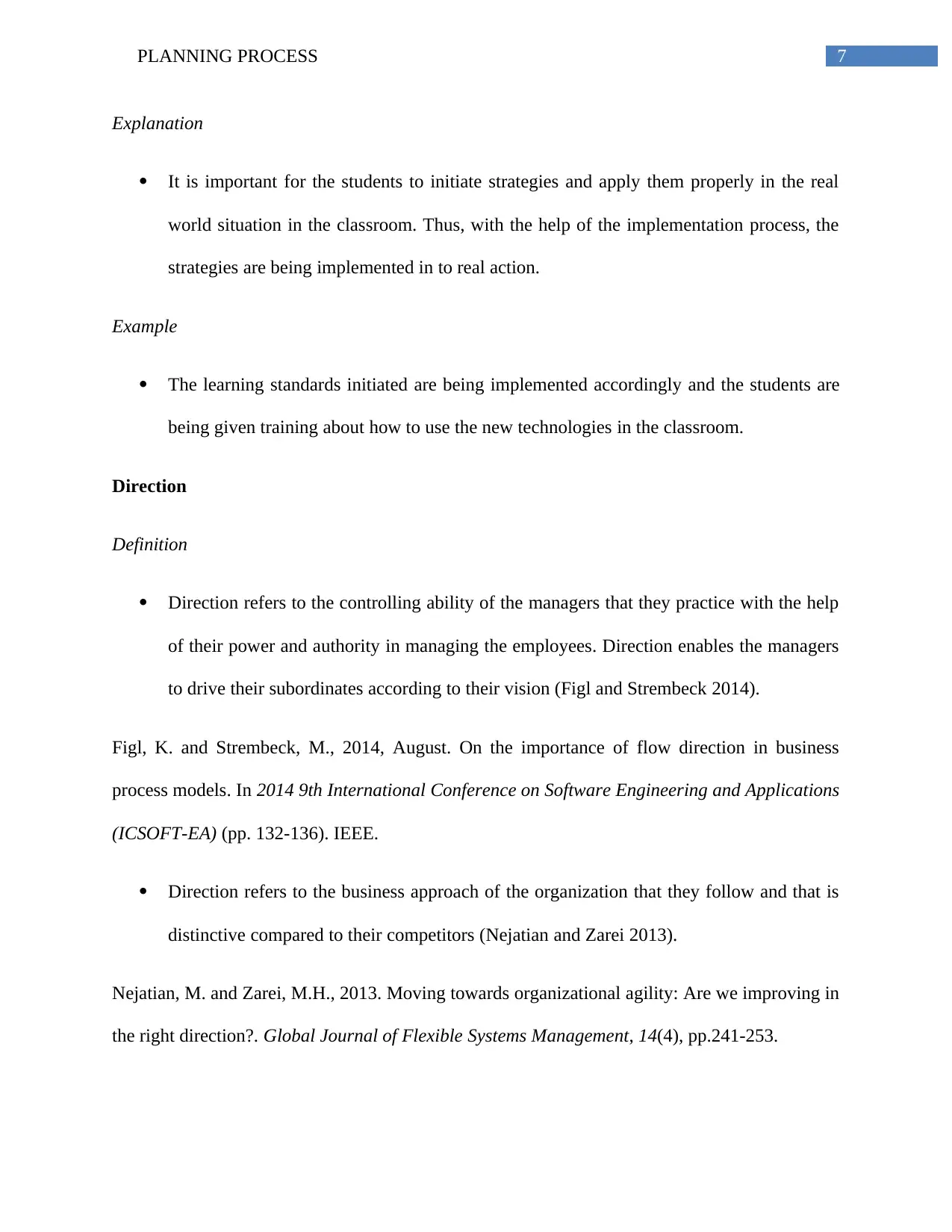
7PLANNING PROCESS
Explanation
It is important for the students to initiate strategies and apply them properly in the real
world situation in the classroom. Thus, with the help of the implementation process, the
strategies are being implemented in to real action.
Example
The learning standards initiated are being implemented accordingly and the students are
being given training about how to use the new technologies in the classroom.
Direction
Definition
Direction refers to the controlling ability of the managers that they practice with the help
of their power and authority in managing the employees. Direction enables the managers
to drive their subordinates according to their vision (Figl and Strembeck 2014).
Figl, K. and Strembeck, M., 2014, August. On the importance of flow direction in business
process models. In 2014 9th International Conference on Software Engineering and Applications
(ICSOFT-EA) (pp. 132-136). IEEE.
Direction refers to the business approach of the organization that they follow and that is
distinctive compared to their competitors (Nejatian and Zarei 2013).
Nejatian, M. and Zarei, M.H., 2013. Moving towards organizational agility: Are we improving in
the right direction?. Global Journal of Flexible Systems Management, 14(4), pp.241-253.
Explanation
It is important for the students to initiate strategies and apply them properly in the real
world situation in the classroom. Thus, with the help of the implementation process, the
strategies are being implemented in to real action.
Example
The learning standards initiated are being implemented accordingly and the students are
being given training about how to use the new technologies in the classroom.
Direction
Definition
Direction refers to the controlling ability of the managers that they practice with the help
of their power and authority in managing the employees. Direction enables the managers
to drive their subordinates according to their vision (Figl and Strembeck 2014).
Figl, K. and Strembeck, M., 2014, August. On the importance of flow direction in business
process models. In 2014 9th International Conference on Software Engineering and Applications
(ICSOFT-EA) (pp. 132-136). IEEE.
Direction refers to the business approach of the organization that they follow and that is
distinctive compared to their competitors (Nejatian and Zarei 2013).
Nejatian, M. and Zarei, M.H., 2013. Moving towards organizational agility: Are we improving in
the right direction?. Global Journal of Flexible Systems Management, 14(4), pp.241-253.
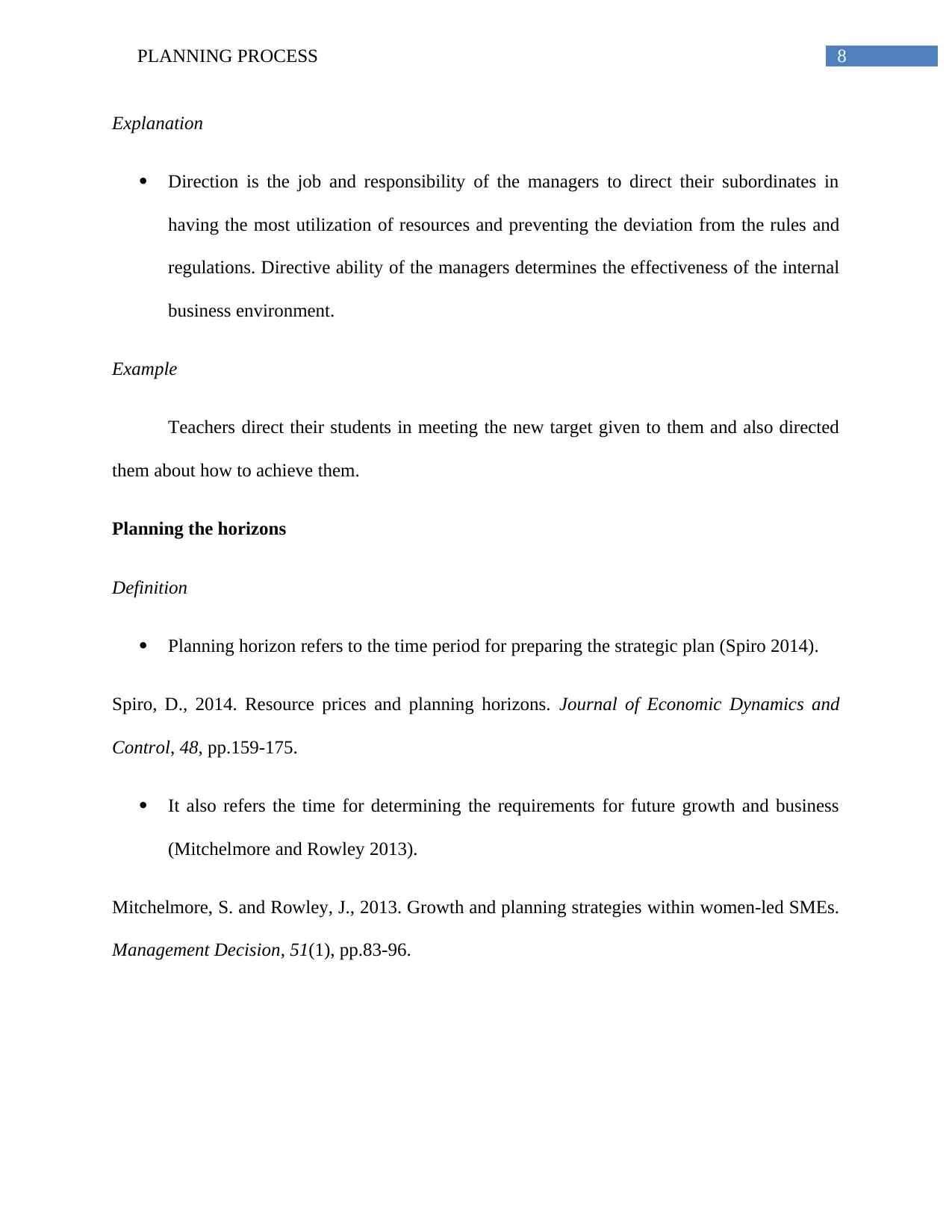
8PLANNING PROCESS
Explanation
Direction is the job and responsibility of the managers to direct their subordinates in
having the most utilization of resources and preventing the deviation from the rules and
regulations. Directive ability of the managers determines the effectiveness of the internal
business environment.
Example
Teachers direct their students in meeting the new target given to them and also directed
them about how to achieve them.
Planning the horizons
Definition
Planning horizon refers to the time period for preparing the strategic plan (Spiro 2014).
Spiro, D., 2014. Resource prices and planning horizons. Journal of Economic Dynamics and
Control, 48, pp.159-175.
It also refers the time for determining the requirements for future growth and business
(Mitchelmore and Rowley 2013).
Mitchelmore, S. and Rowley, J., 2013. Growth and planning strategies within women-led SMEs.
Management Decision, 51(1), pp.83-96.
Explanation
Direction is the job and responsibility of the managers to direct their subordinates in
having the most utilization of resources and preventing the deviation from the rules and
regulations. Directive ability of the managers determines the effectiveness of the internal
business environment.
Example
Teachers direct their students in meeting the new target given to them and also directed
them about how to achieve them.
Planning the horizons
Definition
Planning horizon refers to the time period for preparing the strategic plan (Spiro 2014).
Spiro, D., 2014. Resource prices and planning horizons. Journal of Economic Dynamics and
Control, 48, pp.159-175.
It also refers the time for determining the requirements for future growth and business
(Mitchelmore and Rowley 2013).
Mitchelmore, S. and Rowley, J., 2013. Growth and planning strategies within women-led SMEs.
Management Decision, 51(1), pp.83-96.
⊘ This is a preview!⊘
Do you want full access?
Subscribe today to unlock all pages.

Trusted by 1+ million students worldwide
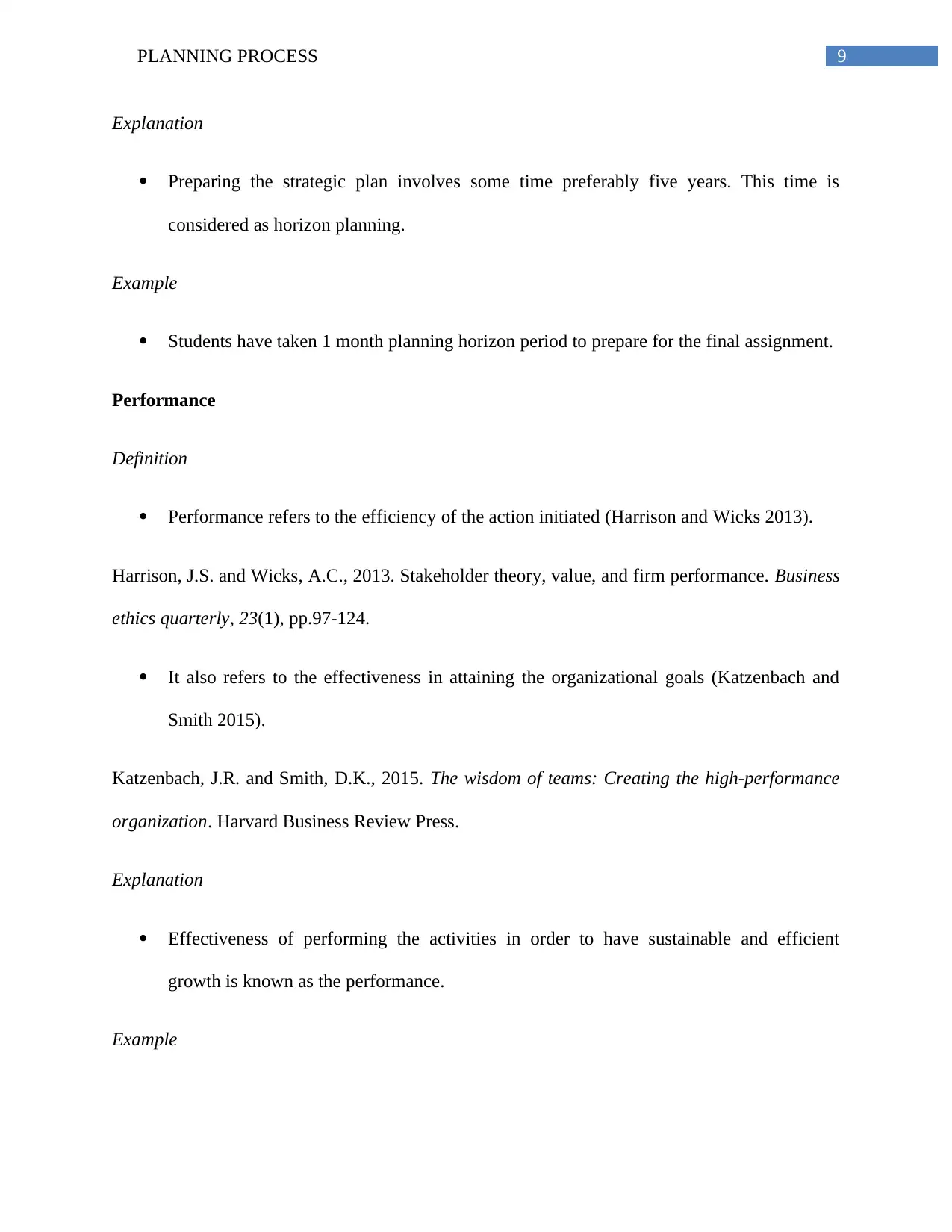
9PLANNING PROCESS
Explanation
Preparing the strategic plan involves some time preferably five years. This time is
considered as horizon planning.
Example
Students have taken 1 month planning horizon period to prepare for the final assignment.
Performance
Definition
Performance refers to the efficiency of the action initiated (Harrison and Wicks 2013).
Harrison, J.S. and Wicks, A.C., 2013. Stakeholder theory, value, and firm performance. Business
ethics quarterly, 23(1), pp.97-124.
It also refers to the effectiveness in attaining the organizational goals (Katzenbach and
Smith 2015).
Katzenbach, J.R. and Smith, D.K., 2015. The wisdom of teams: Creating the high-performance
organization. Harvard Business Review Press.
Explanation
Effectiveness of performing the activities in order to have sustainable and efficient
growth is known as the performance.
Example
Explanation
Preparing the strategic plan involves some time preferably five years. This time is
considered as horizon planning.
Example
Students have taken 1 month planning horizon period to prepare for the final assignment.
Performance
Definition
Performance refers to the efficiency of the action initiated (Harrison and Wicks 2013).
Harrison, J.S. and Wicks, A.C., 2013. Stakeholder theory, value, and firm performance. Business
ethics quarterly, 23(1), pp.97-124.
It also refers to the effectiveness in attaining the organizational goals (Katzenbach and
Smith 2015).
Katzenbach, J.R. and Smith, D.K., 2015. The wisdom of teams: Creating the high-performance
organization. Harvard Business Review Press.
Explanation
Effectiveness of performing the activities in order to have sustainable and efficient
growth is known as the performance.
Example
Paraphrase This Document
Need a fresh take? Get an instant paraphrase of this document with our AI Paraphraser

10PLANNING PROCESS
Students are given training in order to ensure their higher performances in their
examinations.
Students are given training in order to ensure their higher performances in their
examinations.
1 out of 11
Your All-in-One AI-Powered Toolkit for Academic Success.
+13062052269
info@desklib.com
Available 24*7 on WhatsApp / Email
![[object Object]](/_next/static/media/star-bottom.7253800d.svg)
Unlock your academic potential
Copyright © 2020–2025 A2Z Services. All Rights Reserved. Developed and managed by ZUCOL.